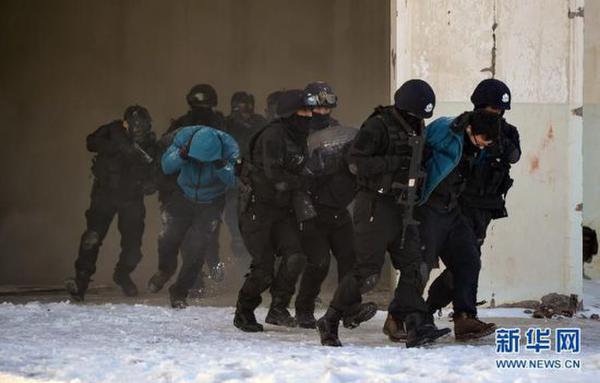 |
|
SWAT team members subdue suspected "hijackers" during a drill in Urumqi, Xinjiang Uygur autonomous region, on Monday, Dec 29, 2014. [Photo by Fang Tao / Xinhua] |
URUMQI -- A total of 181 terror groups were dismantled after a sweeping campaign by police in northwest China's Xinjiang Uygur autonomous region was launched a year ago.
According to data revealed by the publicity office under the regional committee of the Communist Party of China, 96.2 percent of the terror groups were thwarted at the planning stage and 112 suspects turned themselves in to the police.
The campaign was launched a day after the May 22 bombing of a market in the regional capital of Urumqi that killed 39 people in 2014.
In addition to terror activities, the police have also clamped down on religious extremism and video and audio clips propagating terrorism, as well as intensified crackdowns on illegal border crossings.
According to official figures, only 8.7 percent of verdicts on the terror cases given by the region's courts over the past year were appealed by defendants, significantly lower than the proportion among ordinary criminal cases in the region.
Residents from all ethnic groups in Xinjiang have constituted an important force in fighting terrorism, as the police have solved 81 terror cases based on tipoffs during the campaign.
In early August last year, more than 30,000 volunteers helped local police chase suspects in Karakax County. Local authorities later promised to offer more than 300 million yuan (about $48 million dollars) in cash rewards to those who helped hunt suspected terrorists.
In another typical case in Kashgar, where police officers swiftly solved a terror case in January this year, relatives of a terrorist suspect reported clues to the police and local residents volunteered to help track the suspect by setting up checking points and conducting household surveys.
Auxiliary police officer Eli Ismail died fighting a terrorist attack in Baicheng County in February. His grieving father, however, gave full support to a different son's dream to be a policeman.
"If he dies too, I'll fight myself!" said the father.
To weaken the clout of religious extremism, local authorities have vigorously promoted modern living in the region. For example, they have encouraged Uygur women to abandon the burqa, an Islamic garment that covers women's faces, and instead wear their colorful traditional dress.
The regional legislature has approved a regulation banning the wearing of the burqa in public places in Urumqi.
Related: Three executed over Kunming terrorist attack
KUNMING - A Chinese court executed three men for leading a terrorist attack that killed 31 people at a railway station in Kunming, capital of Southwest China's Yunnan province, last year.
Iskandar Ehet, Turgun Tohtunyaz and Hasayn Muhammad were executed upon approval by the Supreme People's Court, the Kunming Intermediate People's Court said.
The three were convicted and sentenced to death in September 2014 after being found guilty of organizing and leading a terrorist organization as well as murder. Their death penalties were upheld by the Yunnan Higher People's Court a month later.
A group of assailants armed with knives randomly attacked civilians at the railway station, causing 31 deaths and injuring another 141 on March 1, 2014. Police shot dead four of the attackers, wounded and captured a female suspect.
The female assailant, Patigul Tohti, who was pregnant when arrested, has been sentenced to life.
Investigators found that the three men had been training recruits for terrorist activities, including the attack at the Kunming railway station, since December 2013.
The three men were arrested when planning to illegally cross the Chinese border on Feb 27 in the Shadian township of Yunnan. Two days later, five members of the group carried out the attack.
China has faced growing threats from terrorism in recent years.
Three people were killed and 39 others injured when a sports utility vehicle plowed into crowds near Tian'anmen Square in the heart of Beijing on Oct 28, 2013.
In a more recent case, 40 rioters died in a series of planned bomb attacks in Luntai county, Xinjiang Uygur autonomous region on Sept 21, 2014. Six civilians were killed and dozens injured in the terror attacks.
According to chief justice Zhou Qiang, Chinese courts convicted 712 people for instigating secessionist activities or participating in violent terrorist attacks in 2014, representing a year-on-year increase of 13.3 percent.
